




 |
   |
 |
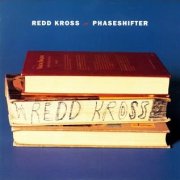 |
Phaseshifter (1993, 44.05) ****/T |
|
| Jimmy's Fantasy Lady in the Front Row Monolith Crazy World Dumb Angel Huge Wonder Visionary Pay for Love |
Ms. Lady Evans Only a Girl Saragon After School Special |
|
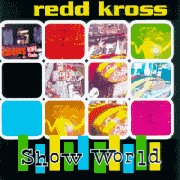 |
Show World (1997, 44.08) ***½/T |
|
| Pretty Please Me Stoned You Lied Again Girl God Mess Around One Chord Progression Teen Competition Follow the Leader |
Vanity Mirror Secret Life Ugly Town Get Out of Myself Kiss the Goat |
|
Current availability:
Mellotrons used:
Redd Kross have been peddling their Cheap Trick-ish cartoon punk/pop/rock for about as long as anyone can remember, the McDonald brothers (Jeff and Steve) forming their first band while barely into adolescence. Their music is immaculately-crafted hook-laden stuff, with more than a hint of Jellyfish about it (although these guys were there first), being the kind of stuff that makes you want to leap around the room making a fool of yourself (especially if you're my age), which is no bad thing.
It's difficult to work out exactly how many albums they've recorded, as name-changes and side-projects confuse the issue heavily, but 1993's Phaseshifter seems to be essentially their fifth full-length release. Their long-running obsession with American popular culture is present and correct (spot the Monkees-esque "Hey hey hey!"s in Pay For Love), as is their vast knowledge of rock history; Huge Wonder follows many other bands in ripping off one of those briefly-heard Black Sabbath riffs that crop up between their better-known ones, in this case from War Pigs. Keyswoman Gere Fennelly adds a bit of Mellotron to the mix, with Monolith (which shamelessly quotes The Hollies' The Air That I Breathe) featuring an, er, monolithic closing section, Mellotron strings and real voices gradually building to a crescendo, although that would appear to be it on the Mellotron front; the deliberately 'munchkinised' sampled voices on After School Special are nothing to do with Mellotrons, before you get all argumentative.
It took the band four years to follow-up with 1997's Show World, after which they took a break for the better part of a decade. Difficult to pick out highlights, but there ain't a duff track here, my only criticism being a slight case of sameyness about some of the material; sensibly, they keep the album to 'vinyl length', resisting the temptation to cram the CD full of b-sides or worse. Fennelly's on keys again (although not as a full-time member this time round), not that there's that much to be heard, although there's a cool Hammond part on Vanity Mirror. The Mellotron strings on Secret Life were arranged by the legendary Brian Kehew (Moog Cookbook etc.) and have a semi-orchestral feel to them, rather than just the usual block chord thing that so many players do. Not enough to recommend the album on the Mellotron front, but if you're looking for some good driving music, you could do a hell of a lot worse. Incidentally, final track Kiss The Goat is an ironic look at '60s Californian devil-worship, finishing with a musical quote from Zeppelin's When The Levee Breaks. Smart.
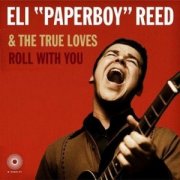 |
Roll With You (2008, 37.58) ***/T |
|
| Stake Your Claim Am I Wasting My Time It's Easier The Satisfier Take My Love With You I'll Roll With You She Walks I'm Gonna Getcha Back |
Won't Give Up Without a Fight (Am I Just) Fooling Myself (Doin' the) Boom Boom |
|
Current availability:
Mellotron used:
Eli "Paperboy" Reed (a.k.a. Husock) is the kind of artist over which Mojo mag and Jools Holland masturbate furiously, probably nightly. Although born in the '80s, he's a living, breathing throwback to the Chicago soul/blues of the late '60s, having clearly perfected every nuance in sweaty nightclubs across New England, assuming New England actually has sweaty nightclubs. His second album, 2008's Roll With You, could so easily be from 1969, although, like many other 'retro'-styled albums, the modern production gives it away. I feel slightly churlish giving it a measly three stars when I'm so generous to similarly reconstructive efforts in other genres, but, at least to my ears, there's a spark of authenticity missing here, for obvious reasons, although I know full well that Reed's growing fanbase would (and maybe will) disagree with me vociferously.
Reed plays Mellotron strings on I'll Roll With You, with a perfectly decent part that enhances the track nicely. Given the man's credentials, I heavily doubt that it's sampled, although I don't know where he sourced a real machine. So; almost spot-on perfect, brass-heavy soul/blues of a kind that's almost vanished from this Earth, except in, er, Blues Brothers tribute bands. Recommended if that sounds like your bag.
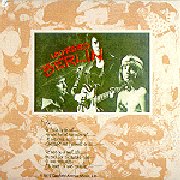 |
Berlin (1973, 49.32) ***½/T |
|
| Berlin Lady Day Men of Good Fortune Caroline Says I How Do You Think it Feels Oh Jim Caroline Says II The Kids |
The Bed Sad Song |
|
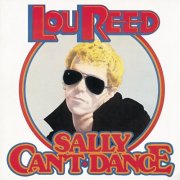 |
Sally Can't Dance (1974, 32.58) **½/½Ride Sally RideAnimal Language Baby Face N.Y. Stars Kill Your Sons Ennui Sally Can't Dance Billy |
Current availability:
Mellotrons used:
Berlin was Lou's third post-VU solo album, produced by Bob Ezrin (Alice Cooper, Pink Floyd et al.), resulting in a rather more 'stadium' sound than its predecessor, Transformer. It's also a darker record, although probably slightly less confessional, though still recognisably Lou Reed.
Ezrin's credited with playing Mellotron, although there doesn't seem to be much of it; I think it's Mellotron on Lady Day, but with real strings on the track as well, it's rather hard to tell. However, that's definitely Mellotron on Caroline Says II, with a well-orchestrated string part, though not enough to make the album worth purchasing for that alone. The flutes on The Kids and Sad Song are just possibly Mellotron, though they're not clear enough for me to say one way or the other. So; if you don't get where Lou's coming from, don't bother. It's a well-crafted album, though, with most of his usual lyrical and musical tricks, just rather less of a Mellotron Album than I'd been led to believe.
Bizarrely, 1974's now barely-remembered Sally Can't Dance was apparently Lou's highest-charting album, at least in the States. Musically, it's a very mainstream mid-'70s effort, although it's as lyrically barbed as the rest of Lou's contemporaneous work; probable best track Kill Your Sons is based on Lou's experience of ECT in his teens in response to his 'homosexual behaviour'. Nice. Mellotron on Ennui (from the album's keys man Michael Fonfara?), with some background flutes that don't make a great deal of difference to the track one way or the other, really.
 |
Whose Hat Covers That Sundial? (2007, recorded 1978, 55.21) ***/TT |
|
| The Bluebloy Life in a Foreign Dream Whose Hat Covers That Sundial? Lizebeth Undecided It Feels So Good to Be Real Again But I Just Don't Know Brittle |
Discouraged Promices Fakir Redemption of the Soul A Passage The Flowers Are Blooming Its Kinda Crazy A Most Difficult Approach |
|
Current availability:
Mellotron used:
In 1978, Jasun Martz produced a rather strange album entitled Whose Hat Covers That Sundial? for West Coast singer/pianist Sue Reed, the tapes only turning up thirty years later. As her CD Baby page accurately states, she was years ahead of her time in her tortured approach to composition and performance, predating the likes of Björk and Joanna Newsom by decades. All but two of its fifteen tracks feature Ms. Reed's playing and somewhat overwrought singing, starkly presented, the other two (It Feels So Good To Be Real Again and Its Kinda Crazy) adding Martz on bass and drums, giving the impression of a full band.
Martz adds his Mellotron to a handful of tracks, with an effective string part on Lizebeth, strings backing the 'band' on It Feels So Good To Be Real Again, strident, mad strings on Discouraged Promices [sic] and a rather more sane string part on Redemption Of The Soul. Fans of the above songstresses stand a good chance of enjoying this obscurity, while you lot might wish to hear its Mellotron tracks on YouTube.
See: Jasun Martz
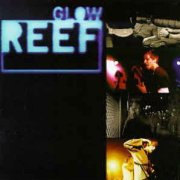 |
Glow (1997, 50.56) */T |
|
| Place Your Hands I Would Have Left You Summer's in Bloom Lately Stomping Consideration Don't You Like it? Come Back Brighter Higher Vibration |
I'm Not Scared Robot Riff Yer Old Lullaby |
|
Current availability:
Chamberlin used:
Kind-of Britpop act Reef's second album, 1997's Glow, is, frankly, a horrible mess, characterised by Gary Stringer's awful, raucous vocals and the anodyne, overlong material. At least Oasis took three albums to produce something this bad. Any better tracks? OK, less awful ones? Maybe the appropriately-titled Don't You Like It? Worst? Where do I start? Possibly I'm Not Scared, with its hideous, yowling 'vocal' track and rhythmic monotony, stretched out to a torturous five minutes, or the excruciating, seven fucking minutes of Robot Riff, Stringer yowling in falsetto this time. They probably thought they were being 'krautrock'. Absolute shit.
Benmont Tench (Tom Petty, of course) plays his Chamberlin, with a few seconds of male voices at the end of Lately Stomping and strings and a high male voice line on Consideration. This was apparently voted 'third best album of the year' by Kerrang! at the time. I knew there was a reason I stopped reading it.
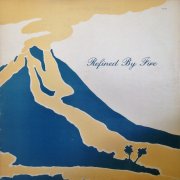 |
Refined By Fire (1980, 36.08) *½/T½ |
|
| Without Love Do You Know Why We're Here? Dream Faith: Beyond Rhetoric Lift My Eyes House Declaration of Dependence Rebellious Child |
Closing Moments Flight |
|
Current availability:
Mellotron used:
Refined By Fire were one of a plethora of American 'Christian rock' acts, the music on their (hopefully sole) eponymous 1980 album being an amalgam of bland West Coast soft rock and, er, bland Christian rock. Any better moments? Maybe some of Randy Rigby's lead guitar work, notably on closer Flight, right at the end of the album. But that's it.
Tony Vasquez plays Mellotron, with background strings and flutes on Do You Know Why We're Here? and Declaration Of Dependence (these titles!), phased strings on Rebellious Child and even more background strings on Flight. Christ (appropriately), this is horrible. Why am I not surprised that the Mellotron's so muted? So is everything else.
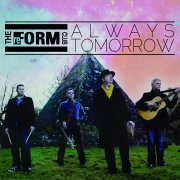 |
Always Tomorrow (2013, 45.15) ***/½ |
|
| Piccadilly Circus It'll Never Be Now Again Lunar Blues Ms Dessie Bell Endless, Faithless Brightling Church Strange Days Girl on the Bus |
Always Tomorrow Down the Earthy Lane My Lovely Little Linda I'm Already Feeling Stronger The Magician So Much Time for Rosemary Pretty Charlotte |
|
Current availability:
Mellotron used:
The Reform Club (named in honour of the London gentlemen's club historically regarded as home to progressive politicians) feature ex-Liberal Democrat MP Norman Baker (sorry, non-Brits, you'll just have to run with this), active in music since the '80s. Their debut, 2013's Always Tomorrow, is loosely comparable to, say, The Kinks, in its very British, observational songwriting, although the album's slightly let down by Baker's rather characterless and underproduced voice (whither reverb?). Stylistically, the band sit somewhere between '60s-esque pop/rock (all clean, strummed electrics) and a folkier feel, highlights including opener Piccadilly Circus, Dessie Bell, Down The Earthy Lane and closer Pretty Charlotte.
I performed on stage with Norman, briefly, in 2011, the link being our mutual friend Nick Awde, so it was slightly less of a surprise than it might have been to get a call from Norman a few years back, asking whether he could hire my Mellotron. Sadly, that was scuppered by logistical issues, so he ended up having Nick play his shiny new M4000 on Strange Days, with a haunting flute part opening the song, although that would seem to be our lot. Not bad, then, although (and it's not often you'll hear me say this) a little more production might've been nice.
See: Nick Awde
 |
Refugee (1974, 49.47) ****/TTT½ |
|
| Papillon Someday Grand Canyon 1st Movement: The Source 2nd Movement: Theme for the Canyon 3rd Movement: The Journey 4th Movement: Rapids 5th Movement: The Mighty Colorado Ritt Mickley |
Credo 1st Movement: Prelude 2nd Movement: I Believe 3rd Movement: Theme 4th Movement: The Lost Cause 5th Movement: Agitato 6th Movement: I Believe (Part II) 7th Movement: Variation 8th Movement: Main Theme Finale |
|
 |
Live in Concert - Newcastle City Hall 1974 (2007, 64.21) ***/TT |
|
| Outro - Ritt Mickley One Left Handed Peter Pan The Diamond Hard Blue Apples of the Moon Someday Papillon She Belongs to Me |
Grand Canyon Suite The Source Theme for the Canyon The Journey Rapids The Mighty Colorado Refugee Jam |
|
Current availability:
Mellotrons used:
Refugee were always something of an oddity; an attempt to sort-of reform The Nice, though without keyboard whizz Keith Emerson, of course. To replace him, the band's management found Swiss wunderkind Patrick Moraz, fresh from a stint with Mainhorse, joining singer/bassist/guitarist Lee Jackson and drummer Brian Davison. The music is vastly better than it had any real right to be; such 'manufactured' bands usually smell like it. Refugee were excellent, if a tad overblown; Moraz doesn't really 'do an Emerson' (well, not much, anyway...), mostly sticking to his own busy style, with multiple keyboard parts running concurrently. I'm reliably informed that the band did tour this material, playing the whole album plus a couple of Nice songs, including that band's only Mellotronic Moment, Diamond-Hard Blue Apples Of The Moon.
The album doesn't open brilliantly, with neither of the first two tracks being particularly great, but the lengthy Grand Canyon Suite makes up for it by being totally bombastic and quite wonderful. The vocal section in the middle doesn't look promising, but turns out to have a hymnal quality to it; think ELP, but better. Credo is Refugee's other major piece; good, though not as good as Grand Canyon. Plenty of decent Mellotron all round, though probably not a classic of the genre. But is it classic prog? The jury's still out on that one, I suspect. Of course, with Moraz's defection to Yes later the same year, Refugee's career was pretty much over before it had begun; shame, really, especially as Moraz only lasted one album with the affirmative ones.
Fast-forward a few decades and Live in Concert - Newcastle City Hall 1974 appears. Is this the only Refugee live recording in existence? If so, its low quality is excusable, as it's a unique document; conversely, if it's not... I've heard a lot worse, but only in the bootleg realm, to be honest; this sounds like a dodgy desk recording, with levels flying about all over the place and an overall muddiness that makes it a difficult listen. Things aren't improved by Jackson's terrible vocals; he not so much sings the words as barks them, in the manner of a wounded dog, while Moraz seems to be doing his level best to sound like Keith Emerson, with synth patches copied direct from Pictures at an Exhibition. It's not all bad, of course, as much of the music stands up well, although a jammed-out version of Bob Dylan's She Belongs To Me does go on a bit. An abbreviated Grand Canyon Suite is excellent (if you ignore the vocals), but Refugee Jam is just pointless. One for completists, I think.
Moraz toured his Mellotron, along with what sounds like a Hammond, a Rhodes and several synths. Interestingly, most of his Mellotron use is quite subtle, with a brief flute line on One Left Handed Peter Pan and a few string chords on The Diamond Hard Blue Apples of the Moon, as on the original (Emerson's only Mellotronic experimentation, as it happens). Papillon features a surprisingly fast, high-end strings 'widdle' absent on the studio version, with an almost-distorted flute line later in the song, while the one 'epic' they tackle here, Grand Canyon Suite, has what sounds like brass and flute melodies in the intro, although the cello line later on disproves this, unless... was he using two Mellotrons onstage? Doesn't seem likely, so chances are the brass was one of his Moogs (it's a monophonic line). n.b. Max Bolch tells me it's none other than a Swiss alphorn! One Mellotron, then... This track also reveals an on-stage grand piano, so there really wouldn't be room for a second Mellotron. Overall, OK Mellotron, but given that the man only has two hands, it isn't featured nearly as much as you might like/expect.
So; Refugee? Buy, particularly if overblown keyboard prog is your bag. Great playing, decent composition and some nice Mellotron. Can't go wrong really, can you? As far as Live in Concert goes, though, you'll have to weigh up how badly you want to hear a badly-recorded version of a slightly ramshackle stage show, just to hear how they managed to play this stuff live as a trio. Incidentally, Ritt Mickley is allegedly named for Moraz' pronunciation of 'rhythmically'! Also incidentally, although I already owned a copy, I found a pristine, still shrinkwrapped copy in an otherwise cruddy chart shop in Auckland for $1NZ; about 30p sterling at the time. How could I resist?
See: Patrick Moraz | The Nice | Yes
Regal Worm (UK) see: |
 |
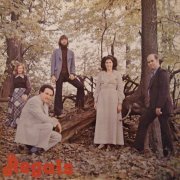 |
Sing the Glory Down (197?, 28.39) *½/TT |
|
| What a Lovely Name The Church Triumphant Love Will Roll the Clouds Away I Never Shall Forget Promises Sing the Glory Down I Should Have Been Crucified Gone |
Hallelujah Square That's Just Like Jesus |
|
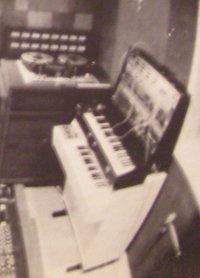 |
Current availability:
Mellotron used:
Yet more Mark Medley Christian crud, folks... The Regals were yet another in a long, long line of American church hall-style godly groupings who, unwisely, elected to record their oeuvre at some unspecified point in the mid-'70s. The undated, yet mercifully brief Sing the Glory Down is every bit as bad as you'd expect, shifting between the aforementioned church hall singalong style (opener What A Lovely Name, Love Will Roll The Clouds Away) and more upbeat, vaguely gospelly material (The Church Triumphant, the title track). The three male/one female group tackle the material with more enthusiasm than talent, one of the male singers bordering hysteria in places, to my delight; well, when you listen to stuff like this for a non-living, you get your laughs where you can...
Now, someone called Jay Petach is credited on the album. Sounds familiar? I've traced a few references to the name, but I really can't say whether or not it's the same guy. Anyway, this Petach plays Mellotron on a few tracks, with 'orchestral replacement' strings on Promises, the title track, Gone and the cringe-inducing Hallelujah Square (did they write this bilge?), although, sadly, it's always kept in the background. The rear sleeve features, for some extraordinary reason, a fisheye lens shot of the studio control room, complete with an M400 topped with a beautiful ARP 2600 (pictured right). Where are they now? And can I have them?
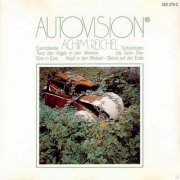 |
Autovision (1974, 41.42) ***½/TTEisenpferdeTanz der Vögel in den Winden Drei in Eins a.) b.) c.) Turbulenzen Jay Guru Dev Kopf in den Wolken - Beine auf der Erde |
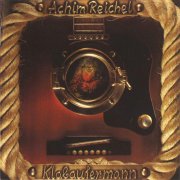 |
Klabautermann (1977, 35.27) ***/T |
|
| Piratentanz Der Klabautermann Feuer Das Störtebekerlied Wir Lieben die Stürme Sophie, Mein Henkersmädel Mit den Taschen Voller Gold Halla Ballu Ballay |
Der Fliegende Holländer Abends an Deck |
|
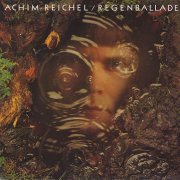 |
Regenballade (1978, 39.04) **½/T½Herr Von Ribbeck auf Ribbeck im HavellandPidder Lüng Een Boot is Noch Buten Regenballade Der Zauberlehrling Nis Randers Trutz Blanke Der Fischer |
Current availability:
Mellotron used:
Achim Reichel (originally of The Rattles) went solo in 1971, recording several albums in various krautrock-related styles before releasing a run of records which attempted to render traditional German folk musics in a modern idiom. 1974's Autovision is the last of his 'pre-folk' efforts, an appealing album of instrumental, jazz-influenced jams (yes, you read that correctly), highlights including opener Eisenpferde and Turbulenzen, effectively ten minutes of reflective, echo-laden clean guitar, sounding not unlike the near-future Robert Fripp. Interesting, thirty-second closer Abends An Deck is a nautical-sounding accordion solo, presaging the direction in which Reichel was moving. Mellotronically speaking, Claus-Robert Kruse adds flutes to part A) of Drei In Eins, while Reichel sticks plenty of flutes and strings on Turbulenzen, enhancing an already very listenable album.
Klabautermann is the kind of album that was still being released in 1977, though not for much longer, seeming to be some kind of concept effort involving the Baltic legend of a largely benign seafaring sprite, typified by opener Piratentanz and Halla Ballu Ballay, sea-shanties both. Musically, the album swims about (enough nautical analogies - Ed.) in a rather wet (that's enough! - Ed.) kind of mainstream slightly folkish rock, perfectly listenable and completely inoffensive, if a little unexciting. To its credit, it's quite unique in its mixture of nautical folk and late '70s pop/rock, but that doesn't necessarily make it that desirable these days. Novalis' Lutz Rahn plays Mellotron, though not a lot, with naught but some wavery, pitchbent strings and more straightforward choirs on Der Fliegende Holländer.
The following year's Regenballade, sadly, is a pretty dull effort all round, still with a slightly nautical folk/rock bent, only rather less appealing this time round, at its best on the more energetic Der Zauberlehrling and Nis Randers. Rahn on Mellotron again, with low-key flutes, choirs and strings on the title track, choirs (and string synth) on Der Zauberlehrling and occasional strings on Trutz Blanke.
I really wouldn't go too far out of your way to hear Klabautermann (let alone Regenballade), although, in fairness, it's vastly better than the drivel with which the likes of the supposedly 'progressive' Novalis and Wallenstein were about to assail their listening public's ears. What a difference a year makes, eh?
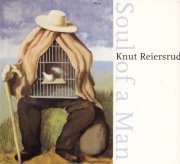 |
Soul of a Man (1998, 65.55) ***/T |
|
| Introduction Blues Power part I I Can't Stop Black Widow Soul of a Man When Seasons Change Big Little Me |
Let Me Turn You on To a Friendly Chap Blinded By Love Let's Do it (Let's Fall in Love) Blues Power part II |
|
Current availability:
Mellotron used:
Knut Reiersrud is a Norwegian blues guitarist who refuses to be constrained by the style, branching out into other musical realms at will. 1998's Soul of a Man is probably at its best on I Can't Stop, a prime slice of electric blues, straight out of 1968, Big Little Me, or at least its less bluesy parts and Let Me Turn You On, while Let's Do It (Let's Fall In Love)'s electronica makes a welcome change.
Reiersrud plays Mellotron on the slightly jazzy Big Little Me (also found on the following year's Sub compilation, previously reviewed here), with a nice flute part opening the track, all wobbles and clicks, reiterating later on. Reiersrud isn't trying to reinvent the wheel, while an obvious criticism is that not only is the album too long, but many individual tracks are dragged out for a minute or more beyond their interest level, but blues fans should quite certainly apply.
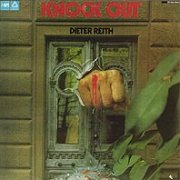 |
Knock Out (1975, 40.04) ***½/TKnock OutOrita Day Dreamer Dark Green |
Current availability:
Mellotron used:
What is it with Germans and fusion? The Release Music Orchestra, To Be, the granddaddies of them all, Passport... Since, unlike prog but like hard rock, fusion rarely displays any cultural identifiers (ignoring ethno-fusion, of course), 'regular' fusion outfits from across the world all essentially sound American, although I wouldn't necessarily say the same thing for other jazz sub-genres. Whatever, organ whizz Dieter Reith's (1938-2020) Knock Out is a good album of its type, never really sinking into tedium, despite only containing four long tracks, although if your patience for endless jazz soloing is anywhere near mine, you'll be running into trouble by the middle of side two.
Reith himself plays (uncredited) Mellotron, with string and flute parts on the opening title track and occasional string swells on Orita, though nowhere near enough to make this a worthwhile Mellotronic purchase. Finally reissued, this is worth the effort for fusion fans, if maybe not for the rest of us. Incidentally, Reith is credited with Mellotron on his 1978 co-credit with American singer Bill Ramsey, On the Spot, but it's not so much completely inaudible as 'almost certainly a string aynth'.
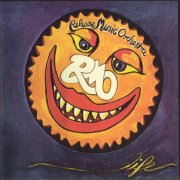 |
Life (1974, 43.02) ***½/T½Eröffnung - Tippa TibanaReyneinblan Damaskus Rot Wild Der Traum des Herrn P. Zemäs Rutan Morgengabe |
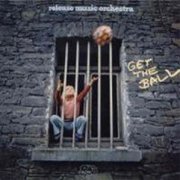 |
Get the Ball (1976, 36.11) ***½/½MestaloggoSundance Get the Ball Black Bird Atlantis Chambre Séparée |
Current availability:
Mellotrons used:
Germany's Release Music Orchestra rose from the ashes of freakout band turned jazz-rockers Tomorrow's Gift, eventually recording five albums. They're usually described as fusion and compared to Passport, but to my ears, there's as much progressive- as jazz-rock in their sound, certainly going by their debut, Life, that unusual, though not unique thing, a live debut album (recorded in Amsterdam and Hamburg, with studio overdubs). Unlike their later work, the album is instrumental and has some fiery playing from all concerned; OK, maybe it is fusion. Fusion-prog. OK? The composition (such as it is) is less impressive, but this is music designed to showcase musicianship, rather than songwriting. OK, it's jazz.
Manfred Rürup plays Rhodes, synth and Mellotron, by the sound of it, although he keeps his Mellotron use well reined-in, with mostly short string parts designed to lift the sound at appropriate moments. Saying that, there's a lengthy organ (?) passage on Zemäs Rutan that almost sounds like a Mellotron (sort of high and wheezy), so is there actually any Mellotron at all? Without a credit, who knows, although it doesn't half sound like one most of the time.
Their first studio album, the following year's Garuda (**½), is Mellotron-free, although there is some minor use on '76's Get the Ball. Overall, the album isn't dissimilar to their debut, mixing fusion and prog in a pretty unique way, concentrating more on composition than lengthy, tedious soloing, although there's a fair bit of that to be heard, too. True to form, Rürup barely uses his Mellotron at all, with merely a faint string pitchbend and a couple of high, sustained notes in the title track and similar in Atlantis. I've never seen anything alluding to any Mellotron use on '78's Beyond the Limit and while their last album, '79's News, has an odd, phased choir sound on one track, it's more likely to be a Roland Vocoder than anything Mellotronic. Musically, the album's a return to fusion-by-numbers, with the addition of polysynths (sounds like a Prophet) and rather dull brass riffs that go on for ever.
So; Life is a reasonably good album, far better than the dull fusion of Garuda, but don't go expecting a Mellotron Monster, while Get the Ball is even lighter on the tape-replay front. An archive live release, Bremen 1978, came out on Garden of Delights in 2004, but I've no idea whether or not there may be any Mellotronic input. As far as these albums are concerned, don't bother for the minimal Mellotron, but fusion fans might apply.
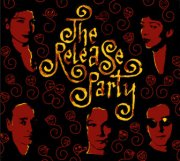 |
The Release Party (1993, 36.00) ***/T½ |
|
| Post Party Done By Mirrors In Her Brand New Shoes Lovely Turn Away He'll Be Daydreaming Land of the Fog |
Poor, Little You Watch Me Capture You My Only Song Too Young to Be a Bitch Parachute Song Don't Say it Again |
|
Current availability:
Mellotron used:
Oslo's The Release Party, er, released just the one, eponymous album in 1993, a female-fronted pop/punk concoction of little originality. Done By Mirrors and Poor, Little You are more harmonically interesting than you might expect, while the uncharacteristically gentle My Only Song stands out, simply due to not being noisy, but, while a perfectly acceptable listen, the rest of this album is unlikely to jump out at you.
Guitarist Pål André Lind plays Mellotron, with warbling, muted flutes on Poor, Little You and My Only Song, although the flutey thing on Parachute Song is Tona Gulpinar's credited wood flute. The Release Party strikes me as a classic case of 'local band', where an outfit does passably well in its home market, playing their own material in a currently popular style for fans who can't get (or afford) to see the genre leaders.
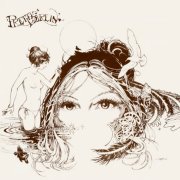 |
Pretty Darlin' (1978, 29.36) **½/T |
|
| Pretty Darlin' Oh Why Spirit Train Forty Miles Treat Me Kind Gold or Silver Down the Road Hands Off Baby |
Stoned Louis Ah Dey Aum |
|
Current availability:
Mellotron used:
Eric Relph is a West Coast figure of no little obscurity, his sole release, 1978's Pretty Darlin', being a late-period, well, West Coast soft rock album. I'm afraid to say he was never in any danger of challenging The Eagles or Firefall, however; while perfectly competent, the songs are too anodyne to grab the public's imagination, while his attempts to up the bpm were doomed to failure, the faux-rocking Spirit Train being a particularly bad example. Above all, releasing a wannabee-mainstream record on the tiny (home-grown?) Evy Pollen label ensured its instant disappearance. Is there a best track? There is, in the form of closer Ah Dey Aum, an energetic guitar instrumental.
Three Dog Night's Michael Allsup plays drifting Mellotron strings on Oh Why, although that's our lot. After forty years of unavailability, this has suddenly popped up on Spotify and YouTube (where d'you think I heard it?), should you have half an hour to spare and nothing better to do.
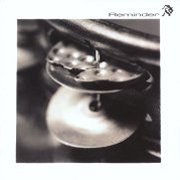 |
Reminder (EP) (1999, 19.23) ****/TT½Can't Do Anything About itTalk it Out Silhouette on the Wall The Trouble With Tommy Broken Tone |
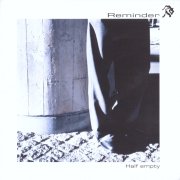 |
Half Empty (EP) (2000, 17.48) ***½/TTT½So GentlyToo Late Half Empty Sad Attempt |
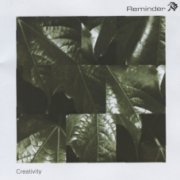 |
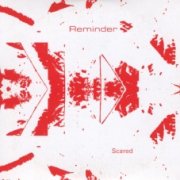 |
Creativity (EP) [a.k.a. Scared] (2000, 16.46) ****/T½ScaredLimelight All Contrast Gone Creativity |
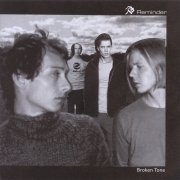 |
Broken Tone (2001, 48.39) ****/TTTT | |
| Scared So Gently Can't Do Anything About it Limelight Talk it Out Lost Sincerity Neversong Sad Attempt |
All Contrast Gone Too Late Creativity Broken Tone |
|
Current availability:
Mellotrons used:
Reminder are another of Änglagård drummer Mattias Olsson's 'intelligent pop' projects he's been involved in over the last few years (see: Pineforest Crunch, Geller); their catalogue effectively consists of three EPs and an album containing tracks from all the EPs and a couple of new recordings. Unlike Pineforest, Reminder have a melancholy aspect to their music, which I find refreshing in these days of 'everybody be bright and cheerful because it sells records' and suchlike. As a result, I don't believe they've set the world on fire saleswise, but they've produced some beautiful, understated music that stands out from the crowd like, er, a Mellotron at a Korg convention.
Talking of which, Mattias' Mellotron is well in evidence on all the above, played by none other than Änglagård keys man Tomas Jonsson (now spelled Thomas Johnson, it seems), who also plays Hammond, piano etc., on the first two EPs and by bassist Tobias Ljungkvist on the third. Mattias has provided me with a track-by-track rundown of the album, but I've had to work out the few tracks that didn't make it for myself. On Reminder, there appear to be three Mellotron tracks, with strings, flutes and cellos splashed all over, sometimes treated, sometimes not. So Gently from Half Empty mixes Mellotron and real strings, while Too Late features a really upfront flute part, plus strings. I'm not so sure about the more upbeat title track, but Sad Attempt is back on form, with some excellent Mellotron cello, strings, choir, brass and pipe organ. Unsurprisingly, it has a largish sound...
Creativity was apparently reissued as 'Scared' after the release of the album and is the one inessential here, as all four tracks made it to Broken Tone. The album gathers together most of their best material, although another three tracks would have mopped up everything. Anyway, their music works really well in the longer format, with the odd faster track to break up the melancholy; it's well-sequenced, too, giving no idea that it's a bit of a mish-mash of tracks. On the Mellotron front, two of the Creativity tracks feature it in a minor way, while of the two new songs, Lost Sincerity is Mellotronless, but Neversong has flutes, cellos and strings.
Y'know, Broken Tone's a bloody good album, Mellotron or not, but I'm not going to try to claim it doesn't improve it, at least to my ears. I'm not sure what the band are doing at the moment, but I'm hoping that this won't be the last we hear of them. Anyway, buy the album, then the first EP, if you can find it.
See: Änglagård | AK-Momo | Geller | Molesome | Nanook of the North | Pineforest Crunch
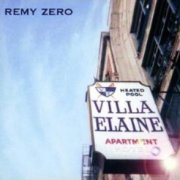 |
Villa Elaine (1998, 49.29) ***/T |
|
| Hermes Bird Prophecy Life in Rain Hollow Problem Whither Vulcan Gramarye Yellow Light |
Motorcycle Fair Goodbye Little World [Untitled] |
|
Current availability:
Chamberlin(s) used:
Going by their second album (of three), 1998's Villa Elaine, Birmingham, AL. natives Remy Zero were an alt.rock-lite crew, like, ooh, about a million others in the '90s. Unlike the genre leaders, they didn't really have the songs, better tacks including the punchy Prophecy, the ambitious, six-minute Hollow and Motorcycle, but, frankly, nothing here really stands out.
On the tape-replay front, it's hard to tell what we're hearing here, as nothing's specifically credited: Patrick Warren's Chamberlin? Benmont Tench's Mellotron? Whatever it is, there's a nice polyphonic cello part on Prophecy and chordal strings on Yellow Light and Fair, little of it to any real effect, to be honest.
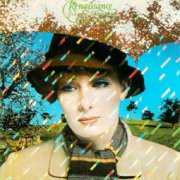 |
A Song for All Seasons (1978, 44.42) ****/TOpening OutDay of the Dreamer Closer Than Yesterday Kindness (at the End) Back Home Once Again She is Love Northern Lights A Song for All Seasons |
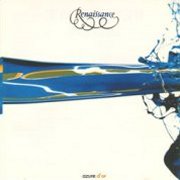 |
Azure d'Or (1979, 43.16) ***½/T |
|
| Jekyll and Hyde The Winter Tree Only Angels Have Wings Golden Key Forever Changing Secret Mission Kalynda The Discovery |
Friends The Flood at Lyons |
|
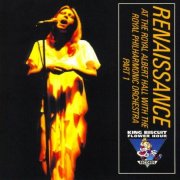 |
At the Royal Albert Hall Parts 1 & 2 (1997, recorded 1977-79, 143.11) ****/½ |
|
| Prologue Can You Understand Carpet of the Sun Can You Hear Me Song of Scheherazade Fanfare The Betrayal The Sultan Love Theme The Young Prince and the Princess Festival Preparations Fugue for the Sultan The Festival Finale |
Running Hard Midas Man Mother Russia Touching Once (is So Hard to Keep) Ashes Are Burning Prologue You |
|
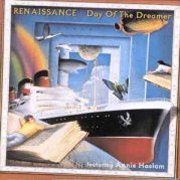 |
Day of the Dreamer (2000, recorded 1978, 73.48) ****/TCan You Hear MeCarpet of the Sun Day of the Dreamer Back Home Once Again Can You Understand/The Vultures Fly High A Song for All Seasons Prologue Ocean Gypsy Running Hard |
Current availability:
Mellotrons used:
By 1978, Renaissance had already notched up many plaudits, though more in the States than their home country, where they are now largely forgotten. Always at the gentler end of the progressive spectrum, with Michael Dunford's acoustic guitar and Annie Haslam's pure soprano voice, they are often mistaken for a folk-rock group, though nothing could be further from the truth. Forming in the late '60s as a Yardbirds offshoot, the original lineup split after their second album, bizarrely being completely replaced by another set of musicians, with most of the originals ending up in Illusion around the same time as their usurpers released A Song for All Seasons.
Typically for its time, the album is a step or two away from Renaissance's earlier full-on symphonic style, with mostly shorter, more accessible material (although there are still two excellent longer tracks, notably Day Of The Dreamer), although unlike many of their contemporaries, they managed not to bland out completely, possibly helped by the fact that they were never the most 'in your face' outfit in the first place. Many of the songs feature a string section (the band often played live with a full orchestra) and although you'd think they were prime candidates for Mellotron usage, it seems keyboard man John Tout never touched one until this relatively late stage in their career. I can actually only hear it on two tracks; Closer Than Yesterday has a little (uncredited) Mellotron flute part, while Kindness (At The End) has instantly recognisable Mellotron strings and church organ. Incidentally, don't think that shorter tracks and a pretty terrible sleeve design equals 'drivel'; A Song for All Seasons is a damn' good album in the Renaissance tradition, er, so to speak. They completely sold out in the '80s, but that's another story...
Next album up, 1979's Azure d'Or, keeps up the band's quality control, although this time round there really aren't any epics, although there are, for the first time, full equipment listings for each track (hurrah!). By this stage, Tout was mainly using grand piano, Yamaha CS80 and CS30, ARP Solina and Pro-Soloist, plus a Mellotron on the last two tracks, Friends and The Flood At Lyons, also heard (uncredited) on Golden Key. He only seems to use it for choirs (male in this case), like many of his contemporaries, but it's quite nice use, if slightly inessential.
1997's King Biscuit recording, At the Royal Albert Hall Parts 1 & 2 (also released as two separate discs, confusingly), does exactly what it says on the tin, mostly recorded in 1977, the second disc including one track from two years later and a previously unissued studio recording. You've heard Live at Carnegie Hall, but this gives us live versions of most of Novella, not least the mighty Can You Hear Me, although casual fans probably need not apply. John Tout had added a Mellotron to his rig by this point, although he uses it so little that it barely seems worth the effort, with naught but a handful of distant choir chords and one upfront male one during the Young Prince And The Princess section of Song Of Scheherazade, plus a choral close to the bonus version of Prologue from two years later.
In 2000, a mystery disc appeared, titled, with considerable unoriginality, Day of the Dreamer. Despite the lack of recording information, keen listeners have nailed most of it down to a BBC performance in 1978, during the Song for All Seasons tour, making it a valuable document for fans, as most live recordings only seem to cover pre-Novella material. As you'd expect from a radio recording, the sound quality's excellent and all concerned are in fine form. Complaints have been made that there's no Northern Lights, although it's perfectly possible that the band elected not to play it that night, despite its 'recent hit' status. Now, I don't know if this was a one-off, but it seems John Tout's studio Mellotron work wasn't in isolation, as he clearly had one on stage this night. Mind you, with all the string synth work on which he was so keen, especially when they weren't using an orchestra, all he uses it for is male voices and then only in short bursts on three tracks. The upshot of which is, while this is an excellent document of live Renaissance towards the end of their useful life, don't bother for the Mellotron. Incidentally, 2008's Dreams & Omens (live at Philadelphia's Tower Theater in 1978), while an excellent record of a partial set from that year, is Mellotron-free.
So; there are better Renaissance albums to buy, Ashes Are Burning and Scheherezade & Other Stories spring to mind, but if you desperately need to hear them use a bit of Mellotron, all these albums are good, though don't expect too much of them. And whatever you do, don't buy anything they recorded in the following decade... n.b. One more Mellotronic item in Renaissance's catalogue is a recent reissue of their rather poor 1971 effort Illusion, which includes several bonus tracks, including All The Fallen Angels. It turns out that this is a 1976 Keith Relf demo, his last recording, in fact and has previously been available on Illusion's terrible posthumous Enchanted Caress, as All The Falling Angels.
See: Illusion
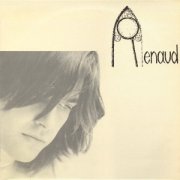 |
Renaud (1975, 36.03) ***½/TBack and inUneasy Serenity Voyage Without a Guide Pretty Stranger |
Current availability:
Mellotron used:
Alain Renaud was a French guitarist who collaborated extensively with Richard Pinhas/Heldon, finding time to record a couple of solo albums, 1975's eponymous effort and the following year's Out of Time. Both albums feature swathes of Renaud's acoustic backdrops and multi-overdubbed electric leads, with other instrumentation dropping in and out of the mix. Renaud sports a side-long opener in Back And In, probably the album's most coherent work, with a more mixed bag on side two, included the Rhodes-heavy Voyage Without A Guide and the rather pointless vocal number Pretty Stranger, which serves only to spoil the mood created by the rest of the record.
To my surprise, Voyage Without A Guide features a couple of brief Mellotron string parts, quite possibly played by a guesting Pinhas (the rear sleeve gives nothing away). We're not talking 'unmissable' here, but it does serve to brighten up a slightly messy piece that can't decide whether it wants to be classical or jazz (never easy bedfellows). To my knowledge, this is entirely unavailable; surely those nice people at Musea could reissue both his albums on one disc? Should you track a copy down, expect a good guitar album with little Mellotron. File under 'reasonable'.
See: Heldon | Richard Pinhas